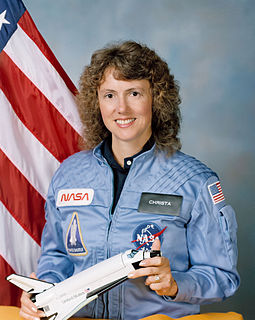A Quote by Konstantin Tsiolkovsky
Mankind will not forever remain on Earth but, in the pursuit of light and space, will first timidly emerge from the bounds of the atmosphere and then advance until he has conquered the whole of circumsolar space.
Related Quotes
There are three reasons, . . . apart from scientific considerations, mankind needs to travel in space. The first . . . is garbage disposal; we need to transfer industrial processes into space so that the earth may remain a green and pleasant place for our grandchildren to live in. The second . . . to escape material impoverishment: the resources of this planet are finite, and we shall not forego forever the abundance of solar energy and minerals and living space that are spread out all around us. The third . . . our spiritual need for an open frontier.
And then, the Earth being small, mankind will migrate into space, and will cross the airless Saharas which separate planet from planet and sun from sun. The Earth will become a Holy Land which will be visited by pilgrims from all the quarters of the Universe. Finally, men will master the forces of Nature; they will become themselves architects of systems, manufacturers of worlds.
For me, a rocket is only a means--only a method of reaching the depths of space--and not an end in itself... There's no doubt that it's very important to have rocket ships since they will help mankind to settle elsewhere in the universe. But what I'm working for is this resettling... The whole idea is to move away from the Earth to settlements in space.
Once the threshold is crossed when there is a self-sustaining level of life in space, then life's long-range future will be secure irrespective of any of the risks on Earth. Will this happen before our technological civilization disintegrates, leaving this as a might-have-been? Will the self-sustaining space communities be established before a catastrophe sets back the prospect of any such enterprise, perhaps foreclosing it forever? We live at what could be a defining moment for the cosmos.
Mankind's journey into space, like every great voyage of discovery, will become part of our unending journey of liberation. In the limitless reaches of space, we will find liberation from tyranny, from scarcity, from ignorance and from war. We will find the means to protect this Earth and to nurture every human life, and to explore the universe. . . .This is our mission, this is our destiny.
If we're not able to launch our own people and operate our own spacecraft anymore then, you know, space - whether it should be or not, it's seen as like a harbinger of technology. If you can fly people into space, if you can operate into space, then you've got high technology and if you're the leader of that, then you're the leader in technology. If we lose that on a more or less permanent basis, or for a long period of time, my fear is that it will creep into the national psyche in all areas and we as a nation as a whole will kind of be diminished.
From space, astronauts can see people making love as a tiny speck of light. Not light, exactly, but a glow that could be confused for light - a coital radiance that takes generations to pour like honey through the darkness to the astronaut's eyes. In about one and a half centuries - after the lovers who made the glow will have long since been laid permanently on their backs - the metropolitan cities will be seen from space. They will glow all year. Smaller cities will also be seen, but with great difficulty. Towns will be virtually impossible to spot. Individual couples invisible.
Flight out of the atmosphere is a simple thing to do and should have been available to the public twenty years ago. Ten years from now, we will have space tourism where you will be able to see the black sky and the curvature of the earth. It will be the most exciting roller coaster ride you can buy.



































